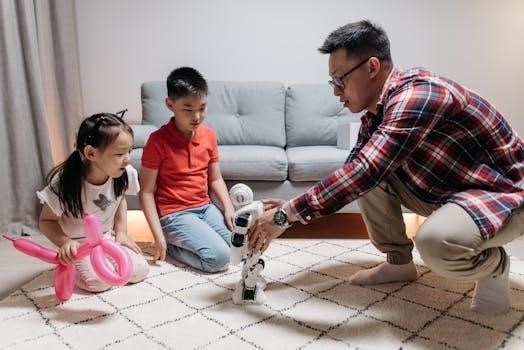The Impact of AI on Society and Industries
Artificial intelligence is rapidly transforming society and industries, offering new solutions while presenting challenges. Its ethical development is crucial, ensuring transparency and accountability as AI becomes more integrated into our daily lives and work.
Ethical Considerations in AI Development
The development of artificial intelligence necessitates careful consideration of ethical implications. It’s crucial to ensure AI systems are transparent, accountable, and avoid bias, which could perpetuate societal inequalities. As AI becomes more powerful, questions arise about consent, data privacy, and the potential for misuse. We must proactively address these concerns to prevent discriminatory outcomes and maintain fairness. The responsible implementation of AI is paramount, requiring a focus on human values and well-being. It’s important to establish regulations and guidelines to steer the development of AI in a direction that benefits all of society. Neglecting ethics could lead to unintended consequences, eroding trust and hindering AI’s potential to create a better future. Therefore, ethical debates and frameworks must be central to the AI development process. The future depends on us. We must ensure that AI serves humanity’s best interests.

Technology Trends Shaping the Future
Several key technology trends are poised to shape our future. These include advancements in virtual reality, cloud computing, and robotics, which will impact various sectors and our daily routines in the coming years.
The Internet of Bodies and Virtual Reality
The convergence of the Internet of Bodies (IoB) and virtual reality (VR) is set to redefine human experiences. The IoB, with its network of sensors and wearable devices, will provide unprecedented insights into our health and well-being, enabling personalized healthcare and preventative measures. Coupled with VR, this creates immersive environments that blur the lines between physical and digital realities. Imagine virtual simulations aiding in medical training, remote diagnostics, or creating hyper-realistic experiences for entertainment and education. As these technologies mature, we will see a seamless integration of the digital and physical realms, potentially transforming how we interact with the world and with each other. This could lead to more efficient healthcare systems, enhanced learning opportunities, and new forms of entertainment, enriching our lives in profound ways. The ethical considerations, especially regarding data privacy and security, must be addressed to ensure the responsible deployment of IoB and VR.
Cloud Computing and Data Management
Cloud computing has revolutionized how we store and process information, offering scalability and accessibility across devices; This shift enables efficient data management, allowing for real-time analysis and insights. With increased reliance on digital platforms, the cloud facilitates collaboration and innovation by providing access to vast amounts of data. The ability to store and manage data remotely enhances business efficiency and opens new possibilities in various sectors, from healthcare to education. Furthermore, advancements in data management techniques ensure that information is handled securely and responsibly. Cloud technologies are not only essential for current operations but are also paving the way for future technological advancements. As the demand for data storage and processing continues to grow, cloud computing will become even more critical for a connected and efficient world. The focus on data security and privacy will remain paramount.
Robotics and Automation in Various Sectors
Robotics and automation are increasingly transforming various sectors, from manufacturing to healthcare, enhancing efficiency and precision. In manufacturing, robots are automating repetitive tasks, leading to increased production and reduced costs. In healthcare, robotic surgery offers greater accuracy and less invasive procedures, improving patient outcomes. Automation is also impacting logistics, with robots handling tasks such as warehousing and delivery. The integration of AI into robotics further enhances their capabilities, enabling them to perform more complex tasks. As technology advances, we expect to see robots take on more roles, improving productivity and safety. These developments require a focus on training people for new types of jobs and adapting to the changing landscape. The widespread adoption of robotics will reshape industries and daily life, requiring us to consider the societal and economic implications while pursuing its benefits. The focus will be on finding the right balance between human and machine labor.

Future of Work and Education
The future of work and education is being reshaped by technology, requiring new skills and training. Emphasis on science, technology, engineering, and math is crucial for navigating the changing job market.
Skills and Training for a Changing Job Market
The rapid advancement of technology, especially AI and automation, is significantly altering the job market, making it crucial for individuals to adapt and acquire new skills. Traditional roles are being transformed, and new ones are emerging, requiring a shift in educational focus. There is a growing need for skills in areas like data analysis, software development, and robotics; Furthermore, proficiency in human-centric skills like critical thinking, problem-solving, creativity, and emotional intelligence will become increasingly valuable. Continuous learning and upskilling will be essential for remaining competitive. Educational institutions must adapt their curricula to meet these changing demands, providing opportunities for individuals to acquire the necessary skills for the future workforce. The ability to learn new skills quickly and adapt to change will be paramount. This includes focusing on both technical expertise and soft skills, creating a well-rounded workforce ready for the challenges and opportunities of a technology-driven future. The emphasis must be on lifelong learning and adaptability.

Health and Well-being in a Tech-Saturated World
Technology’s impact on health is complex, offering both benefits and challenges. Personalized medicine and gene editing promise advancements, but we must also consider the implications for well-being in an increasingly digital world.
Personalized Medicine and Gene Editing
The future of healthcare is being reshaped by personalized medicine and gene editing. Advances in technologies like CRISPR-Cas9 hold the potential to correct genetic disorders before birth, possibly reducing hereditary diseases. Regenerative medicine, fueled by stem cell research, could enable regrowing body parts, addressing organ shortages. In the coming years, patients might expect healthcare providers to use their complete genetic information for tailored treatments.
However, these developments raise significant ethical questions. We must carefully consider issues of consent and equality of access when modifying genetic traits. There could also be unforeseen health complications. Ensuring data protection and preventing misuse of genetic information, such as denying treatment based on genetic factors, is essential. Navigating these challenges is crucial to realize the optimistic potential of these technologies for a better future.
Sustainability and Climate Change
Addressing climate change is crucial for the future. Technology will play a vital role, with stricter regulations forcing providers to cut emissions and transition to clean energy sources, ensuring a more sustainable world.
Technology’s Role in Addressing Environmental Issues
Technology is pivotal in tackling environmental challenges, offering innovative solutions for a sustainable future. From renewable energy systems powering data centers to circular manufacturing processes, technology enables waste reduction and efficient resource management. AI-driven solutions can optimize energy consumption, predict environmental changes, and enhance resource allocation. Furthermore, electric car batteries can be repurposed for energy storage, and space-based solar power could offer a clean energy alternative. These advancements will be critical in mitigating climate change and promoting ecological balance. The implementation of technology in waste management can revolutionize recycling and reduce landfill burden. By embracing technological innovations, we can strive towards a greener and more resilient planet. Therefore, technology offers a crucial pathway to address the pressing environmental concerns of our time. This involves not only developing new tech but also integrating sustainability into existing systems. The future depends on our ability to harness the power of technology for environmental good.

The Digital World and Immersive Experiences
The digital world is increasingly immersive, blurring the lines between online and offline realities. The metaverse and virtual reality are transforming how we interact, work, and experience entertainment, creating new possibilities.
The Metaverse and the Blurring of Online/Offline Realities
The metaverse represents a significant shift in how we perceive and interact with digital spaces, increasingly blurring the lines between our online and offline lives. This evolving digital realm promises immersive experiences that go beyond traditional internet interactions, encompassing virtual worlds, augmented reality, and mixed reality applications. As technology advances, the metaverse may become an integral part of our daily routines, impacting work, social interactions, and entertainment.
The concept, though facing some recent shifts in popularity, still holds the promise of creating a parallel digital existence where our digital experiences become as important and consequential as our physical ones. The potential for seamless integration between the physical and digital worlds could be transformative, though ethical considerations, including data protection and equality of access, must be addressed. While some anticipate a backlash from future generations, the allure of immersive experiences will likely continue to shape our interaction with technology for years to come.
